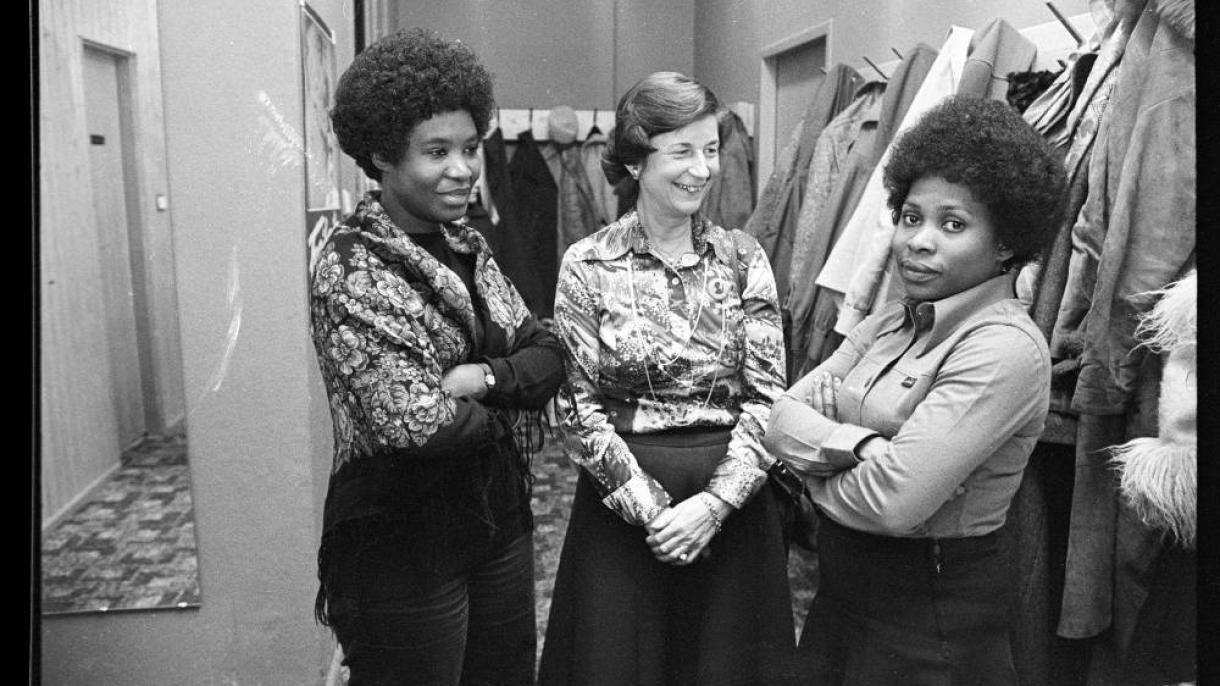
Film presentation and talk
- Wednesday, 13. June 2018 6:00 pm – 9:00 pm Save in my calendar
Decolonize 1968!
The experience of BPOC women* in the history of the movement
Presenter: Peggy Piesche
‘1968’ has come to stand for the years of seismic social transformation and political change that have significantly influenced our fundamental understanding of equal rights, sexual self-determination, political participation and freedom of expression pushed by the protest movements. Fifty years later, a majority of societies have elevated the memory of 1968 to a turning point for the realization of a new sphere of political community that has shaped our current ideals of democracy like no other experience. The ‘68 generation, however, was a not a uniform phenomenon but characterized by solidary fragmented, international black and POC civil rights and liberation movements, which have been woven into a Western-style anti-capitalist and leftist movement history in the current 1968 memory construct. Looking back at 1968 from today’s perspective, such a picture has left voids and blank spots behind, writing various movements and actors out of the memory of the majority societies.
Our event proposes new perspectives and uncovers hidden stories and voices of those who were present at the time and who had a significant impact in West and East Germany because of their historical involvement in anti-colonial, anti-racist and anti-imperialist struggles in Africa, Asia and the Americas. We want shed light on the political involvement of BPOC women*, with their first-hand experience of racism, experienced and perceived in those transformative years around 1968 in both German states. With their (life) stories and voices, it becomes possible to acquire a complex and multilayered understanding of both ‘68 itself and its influence on our understanding of current social and political events today.
Against the backdrop of our current challenges in countering a strengthening far right which is not only attacking the achievements of the ‘68 feminist and socialist movements, but also brazenly reframing them ethnically and thus appropriating them. It becomes particularly important, to show where and how the linking of dimensions of inequality and intersection of categories of difference were already actively practiced and demanded by different movements at that time. When we reflect on the kind of inclusive feminism we want to practice today, with whom we want to align ourselves, and from which perspectives onto history we want to learn and draw upon, we need to know the (life) stories of the BPOC women* and their contribution to social and political change at that time. In the tense environment of sexism and racism of the 1960s, they fought for self-determination, for the political collective recognition of their communities and were key actors in socio-cultural transformation processes that can be traced until today.
Participants:
- Prof. Maisha Auma (educationalist)
- Sevim Çelebi-Gottschlich (former member of the Berlin state parliament, activist)
- Arfasse Gamada (psychologist)
- Nicola Lauré Al-Samarai (cultural scientist)
- Anita Awosusi (author, activist)
- Isidora Randjelović (social education specialist, social worker)
Program:
6:00 pm Doors open, preview of the exhibition “Decolonize 1968! Interviews of BPOC Contemporary Witnesses”
6:15 pm Welcome by Peggy Piesche, representative of the Gunda Werner Institute: “Decolonize 1968! Interviews of BPOC Contemporary Witnesses” video trailer
6:30 pm “The Collective Wealth of Experience, 1968 – 2018: Interviews with BPOC Contemporary Witnesses”, Prof. Maisha Auma
Setting the tone musically: the String Archestra **
7:00 pm “Decolonize 1968! Interviews of BPOC Contemporary Witnesses”: video excerpt on Fasia Jansen
‘68 in Motion! Germany as a Diaspora: Sevim Celebi-Gottschlich, Arfasse Gamada and Nicola Lauré al-Samarai
7:30 pm “Decolonize 1968! Interviews of BPOC Contemporary Witnesses”: video excerpt on Ilona Lagrene
The Long ‘68ers: a conversation about the generation with Anita Awosusi and Isidora Randjelović
8:00 pm String Archestra and reception
** The String Orchestra (under the direction of Dr. Daniele G. Daude) is a classical string orchestra consisting of professional musicians of color. The orchestra was founded in Berlin in 2016. Its repertoire covers a wide range of periods – from early Baroque to contemporary music, as well as from Beethoven to Piazzolla – with special attention being paid to ‘unknown’ composers of color from Chevalier de Saint-George to Janelle Monáe.
Note:
BPOC stands for the political self-designation Black and People of Color, which takes up a shared experience of racism and integrates it into a collective alliance position. The asterisk (*) denotes the constructed quality of the category ‘woman’ and permits thinking about identities and self-positioning beyond the historically common and mostly ascribed designation practices (such as ‘women’ and ‘lesbians’) and thus provides scope for activists.
Contact:
Peggy Piesche
piesche@boell.de
+49 30 285 34-123
- Address
-
Heinrich-Böll-Stiftung - Headquarter Berlin
Schumannstr. 8
10117 Berlin
- Organizer
- Gunda-Werner-Institut für Feminismus und Geschlechterdemokratie
- Legal
- Terms and Conditions
- Language
- German
- English
- Livestream
- Watch livestream
